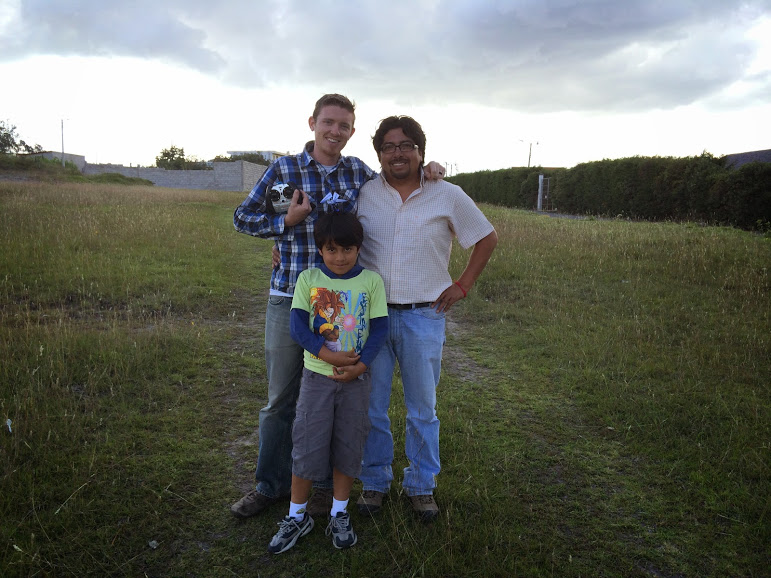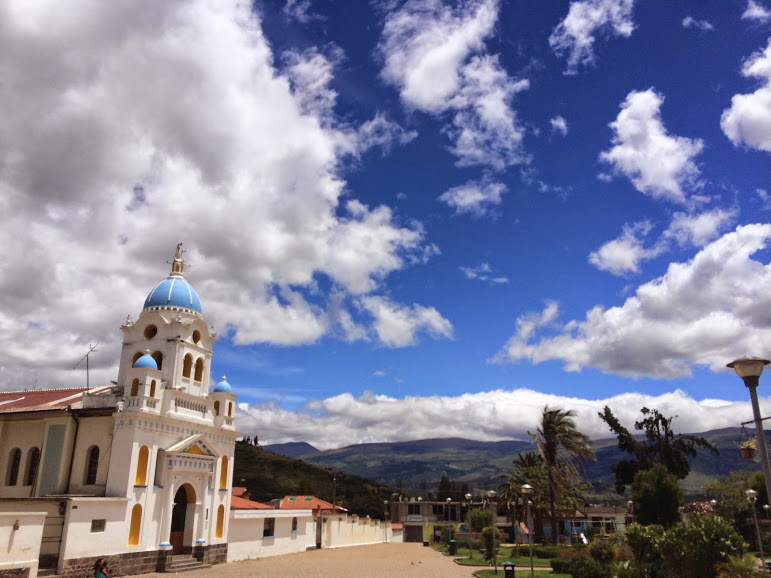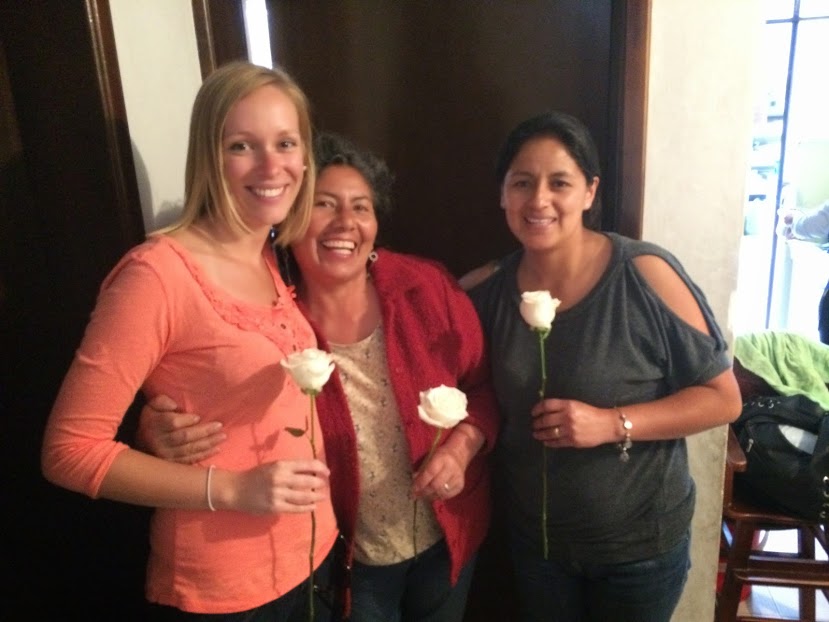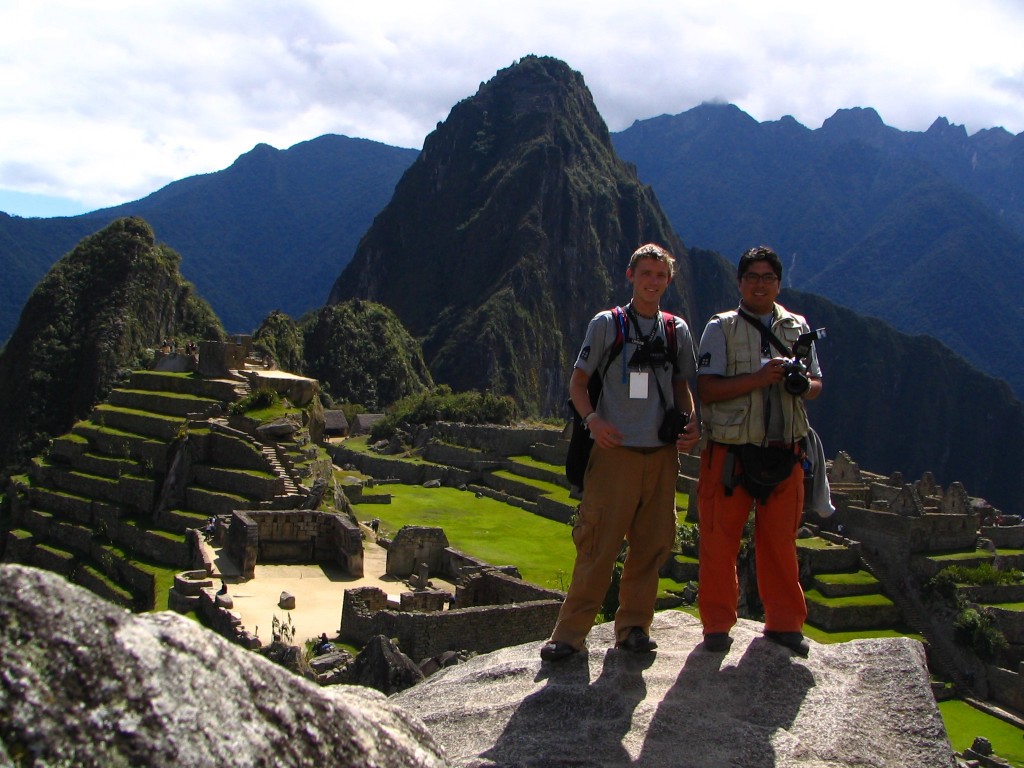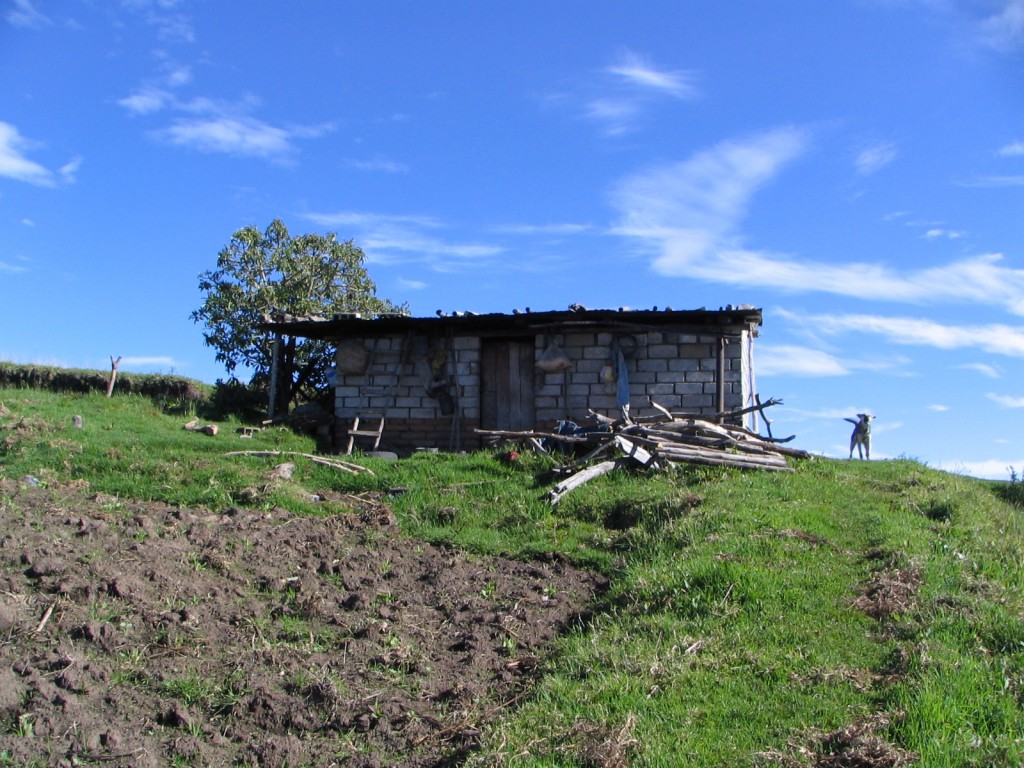Fabian and his family have been great friends of Kristina and I since we first studied in Ecuador over 10 years ago. Our return trips to Ecuador have been to attend his wedding, baptize his son as my Godson, and visit his wonderful family. Since Fabian was young he has worked to organize and develop his community and has been a great source of inspiration. We are excited for the possibility of partnership with Fabian and it has been a great comfort to us to know that we will already have friends who can help us transition to living in Ecuador. He is a dynamic leader and at my request, he has written a compelling short autobiography and perspective on his community. I have done a very simple, literal English translation of what he has sent me, below.
My childhood, and the most wonderful part of my life I spent in San Juan Bautista Angamarca, Alangasí Parish, about 45 minutes outside of the capital of Ecuador: Quito. My neighborhood is nestled on the slopes of Mount Ilaló, at 2,500 meters above sea level.
For us – the local children – growing up near a river, a mountain creek was a privilege. There exists no better toy, no better entertainment than that offered by nature. Exploring its ravines, its forest; and becoming “field scientists” gradually discovering and understanding the reasons for some of the phenomena that surrounded us. There was an invisible teacher, and our school was our backyard.
Like many local families, we used the river just outside of the community to wash our clothes and swim. We would go down to the river with my mother to bathe and wash clothes on large stones, which were also used as diving boards to launch us into the water which seemed abundant and endless. That happiness of these memories is indescribable, perhaps because today these places would be impossible to recognize, today our river is polluted.
My childhood was influenced by people who worked towards improving our community, my father was a local leader bringing improvements to the neighborhood such as roads, water and sewer systems, lighting, telephone lines, the communal house, etc. Community meeting and work projects were part of our way of life. In front of my house there was a small stadium where people would congregate on weekends to play and watch sports, especially soccer. This stadium became our playground the meeting point for the children of the community.
I am sure that the intangible ideas and values of my parents were inherited by me – ideas of the organizational processes interested me even as a child. I learned how to organize people and bring them together as a means to achieve our goals. When I was 11, adults in the neighborhood would call me: “father of the little ones” because we had a group that organized football tournaments for children, hiking and camping in the mountains; we even had a clubhouse provided by nature, behind the stadium was a cave formed by bushes that served us as our meeting house .
My childhood was marked by a direct relationship with nature and with neighborhood friends. In the interest of improving our economic situation, my parents opened a hardware store in the parish of La Merced, next to the town square. We moved and my teenage years were spent in a completely different setting, one that can be defined as an environment more gray than green. My new friends were young people with their own concerns, new fashions and above all, a night life.
My transition from child to teenager was difficult for my parents who saw growing up in an urban environment as a negative thing; rock music, my black tee shirts, school friends, my selfish interest, fights with my parents were all things that diverted my attention from my community the first years in this parish.
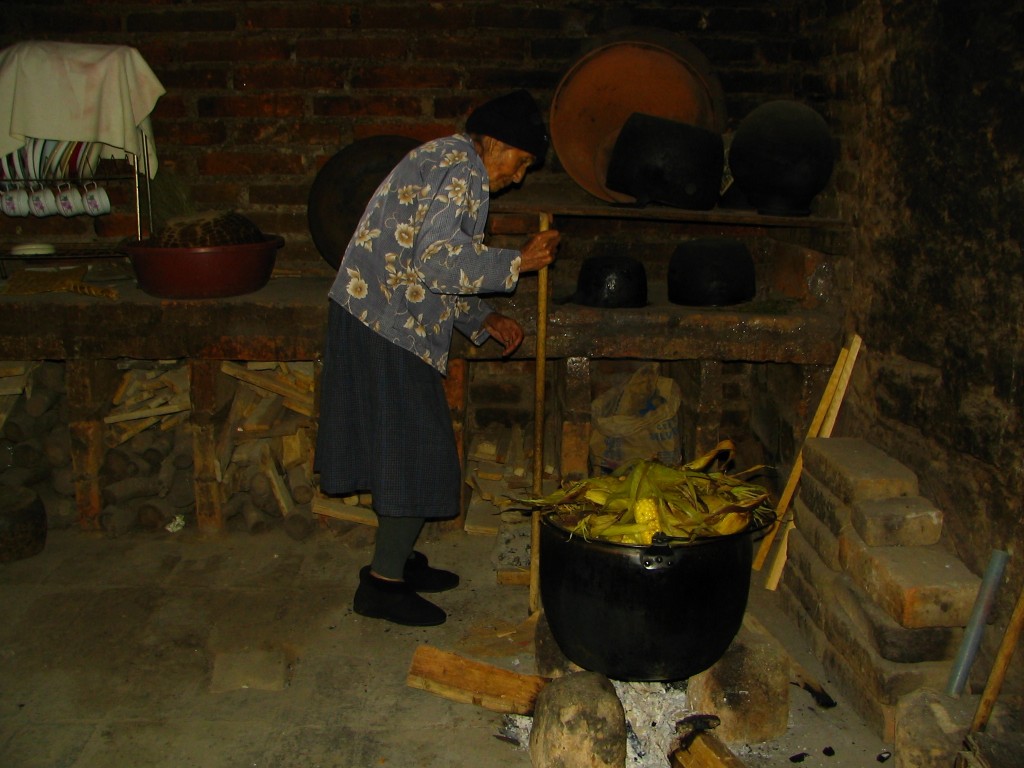
Fabian’s grandmother who is over 100 years old cooking corn over a fire, the same way she has done her whole life
There began to develop a conflict of identity within me between what I was and what I wanted to be. In spite of all the ideas I was hearing in the media and on television, I suddenly developed a strong desire to discover my roots, to find out who I was. I wanted to reveal the stories of my parents and grandparents. Their stories of overcoming difficult situations and escaping poverty fueled my heart, and gave me a strong sense of pride. I began to separate myself from those youthful desires (dancing, going out with friends and girlfriends) and began to invest myself more in my history, my family and my parish. At the same time I began studying electrical engineering at the University – a major in which I had no interest, but had been chosen by my parents. However I was constantly visiting national libraries and sites of historic historic. My inclination for writing was flourishing; and the love of a woman inspired me to further my writing through love letters.
It was then that I met Veronica, a woman of thin build, with light eyes and a purposeful walk. We fell in love, got engaged and began our journey together. We formed our first group of Historical Research with 8 other young people, we collected statements from the grandparents of our parish, the stories of how and why they built the Central Church and compiled them into a book. This project motivated us to keep writing and to create a newspaper published under the name “The Young Interrogator”. As a result of creating this newspaper I began taking an interest in photography, I began to see that an image could tell stories in a bigger way.
This period of writing and photography led me to change my major, I began my studies in Communication for Development; thus expanding the vision we had of alternative forms of communication in La Merced. We produced television documentaries about our communities, we began work on a community radio station; some of these began debates about issues that had previously been hidden. Identity was the main theme of these various forms of communication, and they all had the purpose of building up the self-esteem and self-determination of those living in this rural area.
In 2004 met Erik David Amundsen , a young man with an uncontrollable energy, a few years younger than me, but with a strong spirit. Erik came to La Merced to study at Covenant Bible College. We shared a concern for others that filled us both with empathy. We shared ideas, he met all of my family and I was able to meet his. Erik is an Evangelical, I’m Catholic, but we found no great difference in our faiths, we served the same God. We were like minded in many ways perhaps our only difference might have been the language at the time.
Towards the end of Erik’s stay in Ecuador we decided to undertake a great adventure that would mark our lives forever. We filled our backpacks and with a few dollars we began a journey that would reconnect us with God, a journey to Machu Picchu, the Lost City of the Incas. It was a long bus ride with many stops in coastal and Andean villages. During the trip half my thoughts stayed in La Merced with Veronica and my son who is named Paulino, Erik Paulino – one can imagine that he is named after Erik -and it is so. When we arrived to the ruins we hiked 2 hours to the highest point. We arrived to the top tired and contemplating the magic of this Inca city, at the top of the world in those high rocky mountains we wondered: Who could have inspired the construction of this tremendous city so many years ago? They saw the sun and the moon as deities. We have different ways of interpreting natural forces now, but the same God was Lord of the Incas, of me and Erik. That afternoon I remember with much happiness, Erik agreed to be one of the Godfathers to my son along with my brother, Erik Paulino was soon there after baptized in the Church which was built by our grandparents in the central square of La Merced.
When I was 31 years my town elected me as president of the Parish Government of La Merced, a fairly new public institution like the rest of the countries government – it had only been officially recognized as a local government for 12 years. Its main purpose was providing basic public service and improving the wellbeing of the people of our parish. With the same goals I drove my management of the parish for almost five years. We were able to strengthen the institutions of Local Government, personnel, equipment, and responsibilities in a sustainable way. We implemented important projects of parish integration, we encouraged participation through a model of rural management (Parish Councils, Community Radio, Project Evaluation), all embodied in a Development Plan prepared and monitored by community participation. The plan we developed was recognized in 2013 nationally as a model of public administration.
Unfortunately politics are full of treachery, deceit, envy, hatred and to be honest I could not compete in an ethical way against these forces. My character was tested during the hard times of my term, my honesty in the face of lies and injustices were not compatible with other’s political interests, so the ideas of globalization beat out our local interests and there was never room for anything to the contrary; our motto became: Globalization is worthless if there is no localization serving the people.
At the end of my term I decided not to continue in politics and I began to speak out against the lack of accountability for money management, public policy and decision making. Two days before my term officially ended, 3 computers, two laptops and a hard drive were stolen from the township government office. More important than the equipment was the financial records and informations that were stolen and in essence destroyed. This event wrecked my spirit.
The reasons behind this robbery, the who and the why , we could not find out immediately, perhaps contradictory attitudes towards my time in office have been another blow to my confidence, but I am sure that the truth will come to light over time. Through this hard time I have come away with many lessons, God has taught me to stay strong on this path, he has taught me that personal and family sacrifice has its thorns; he has showed me that beauty, faith in positive action, joy in daily activities; in these things lie true fulfillment.
Today I continue working to develop my community, because the trust people place in me fills me with hope and gives meaning to my life. There is a light that is guiding our steps, now I know that the light of God accompanied me all these years of community work, and I feel that he will continue to call people to join me on this path.
Farming for the parish of La Merced is a legacy that slowly is being pushed into a corner by urban development of the capital. However, there are residents – mostly women – who continue taming the land to grow beans and vegetables; this allows them direct access to their products, those that live long distances from the parish center also combine this agricultural activity with farming of small animals (chickens, guinea pigs), cows, pigs, sheep. This gives us a context of food richness of the rural sector.
Its also important to mention that on the slopes of the sacred mountain Ilaló there are large plots belonging to the whole community – elderly natives of La Merced walk many kilometers daily to reach their land, clear the weeds, care for their crops and at harvest time haul the fruits of their labor down to the village on the backs of their donkeys.
This generates a small economic income, it is what we would call in Ecuador Social Economy, In the absence of a public policy that addresses the needs of the community, our grandparents organized themselves and together they would provide for everyone .Besides the everyday farming activities of these communal farmlands is the formal organization. The cooperative, has over 120 members and is led by a council – made by a representative social structure around 6 members – and within their responsibilities is the care of the mountain and its surrounding, and planning cultural activities. Sadly these ideas are slowly being diluted in peoples minds and they will become only a memory to people of my town.
In this organization is reflected the important role of women. These women, the mothers and grandmothers are generally the ones who actively maintain the land, every year they are the ones who intuitively sow and reap without a calendar or almanac but with the collective memory of many generations of experience. For them and for people in all rural areas life revolves around soil, water, the sun and the moon that signals when it is time to plant.
Many men have left agriculture in search of other professions. In La Merced there are many talented people who specialize in construction, carpentry, locksmithing. These professions has forced many families to neglect their plots, which have turned into pasture lands for those who have cows. And the children of these traditional families have little – if anything – in the way of hope for rural development, their vision is focused on the big cities and what they can offer. Unless something changes it is safe to say that at this rate and because of the age of those who tend the fields agricultural activity in La Merced in 10 to 15 years there will be no local agricultural production, and the only source of food will be the supermarket.

